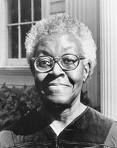
Her poems range from ballads and sonnets to free verse that sounds more like a blues song. Thematically, her poetry reflects the life of the inner city, and growing up an African-American in that inner city.
For National Poetry Month, here are three poems by Gwendolyn Brooks.
A Sunset of the City
Already I am no longer looked at with lechery or love.
My daughters and sons have put me away with marbles and dolls,
Are gone from the house.
My husband and lovers are pleasant or somewhat polite
And night is night.
It is a real chill out,
The genuine thing.
I am not deceived, I do not think it is still summer
Because sun stays and birds continue to sing.
It is summer-gone that I see, it is summer-gone.
The sweet flowers indrying and dying down,
The grasses forgetting their blaze and consenting to brown.
It is a real chill out. The fall crisp comes
I am aware there is winter to heed.
There is no warm house
That is fitted with my need.
I am cold in this cold house this house
Whose washed echoes are tremulous down lost halls.
I am a woman, and dusty, standing among new affairs.
I am a woman who hurries through her prayers.
Tin intimations of a quiet core to be my
Desert and my dear relief
Come: there shall be such islanding from grief,
And small communion with the master shore.
Twang they. And I incline this ear to tin,
Consult a dual dilemma. Whether to dry
In humming pallor or to leap and die.
Somebody muffed it?? Somebody wanted to joke.
Sadie and Maud
Maud went to college.
Sadie stayed home.
Sadie scraped life
With a fine toothed comb.
She didn’t leave a tangle in
Her comb found every strand.
Sadie was one of the livingest chicks
In all the land.
Sadie bore two babies
Under her maiden name.
Maud and Ma and Papa
Nearly died of shame.
When Sadie said her last so-long
Her girls struck out from home.
(Sadie left as heritage
Her fine-toothed comb.)
Maud, who went to college,
Is a thin brown mouse.
She is living all alone
In this old house.
The Good Man
The good man.
He is still enhancer, renouncer.
In the time of detachment,
in the time of the vivid heather and affectionate evil,
in the time of oral
grave grave legalities of hate – all real
walks our prime registered reproach and seal.
Our successful moral.
The good man.
Watches our bogus roses, our rank wreath, our
love’s unreliable cement, the gray
jubilees of our demondom.
Coherent
Counsel! Good man.
Require of us our terribly excluded blue.
Constrain, repair a ripped, revolted land.
Put hand in hand land over.
Reprove
the abler droughts and manias of the day
and a felicity entreat.
Love.
Complete
your pledges, reinforce your aides, renew
stance, testament.
Related:
James Sullivan had compiled a series of links to discussions and literary evaluations of Brooks’ work for the Modern American Poetry project at the University of Illinois.
A concise biography of Brooks compiled by Gale.
- Poets and Poems: Christina Cook and “Roaming the Labyrinth” - April 22, 2025
- Longfellow’s “Paul Revere’s Ride”: Creating a National Legend - April 17, 2025
- Poets and Poems: Katie Kalisz and “Flu Season” - April 15, 2025
Kathleen says
“She was one of the livingest chicks in all the land” loved this.
Marcus Goodyear says
And besides all of this–she actually wrote a poem (We Real Cool) with meter based on spondees–two stresses syllables in a row. Super cool.